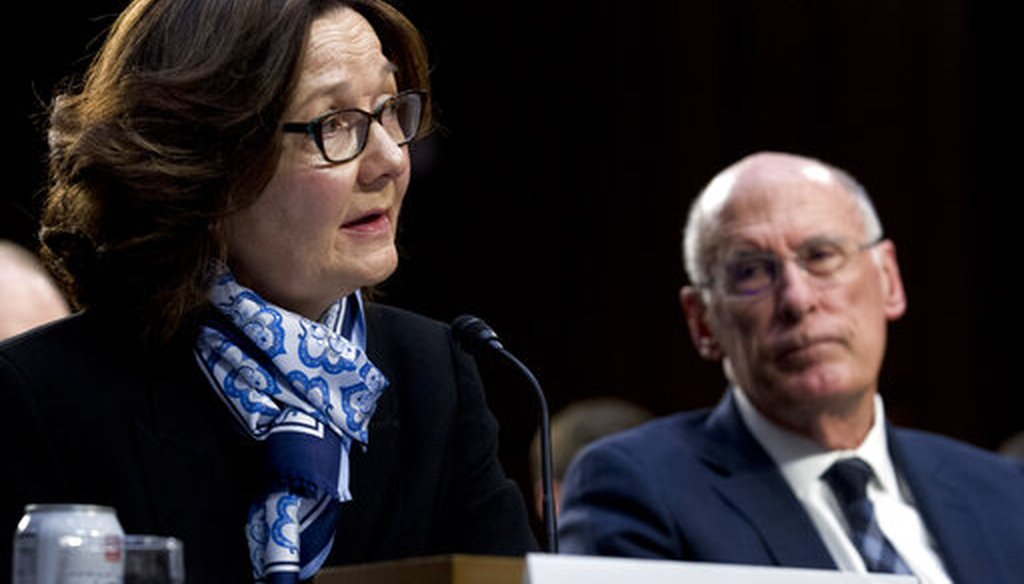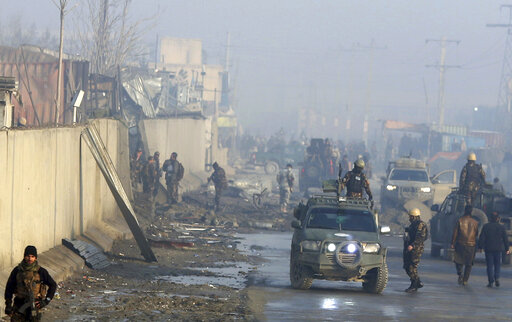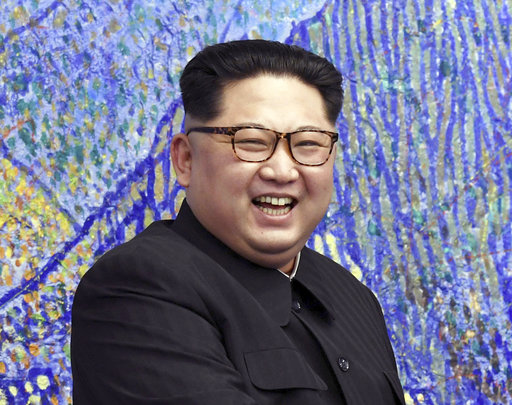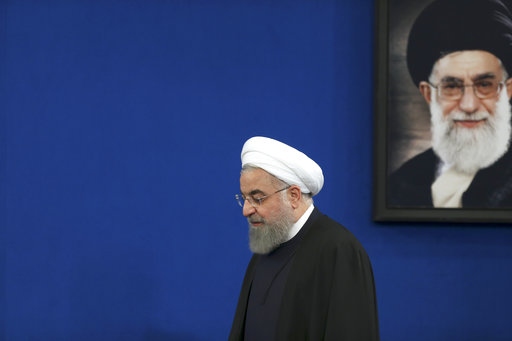Get PolitiFact in your inbox.

CIA director Gina Haspel and Director of National Intelligence Daniel Coats arrive to testify before the Senate Intelligence Committee on Jan. 29, 2019. (AP)
During testimony before the Senate Intelligence Committee, several intelligence officials testified about security threats to the United States in a way that was sometimes at odds with what President Donald Trump has said.
It didn’t take long for Trump to push back against them on Twitter.
"Perhaps Intelligence should go back to school!" Trump tweeted at one point.
We decided to break down what Trump tweeted and what the intelligence chiefs had said to prompt the Twitter response. In his tweets, Trump was mostly responding to statements by Director of National Intelligence Dan Coats and CIA director Gina Haspel. We also looked at the prepared report the intelligence heads presented to the Senate committee.
Here’s how they diverge on four areas addressed in the Senate hearing — ISIS, Afghanistan, North Korea and Iran.
While Trump emphasized ISIS’ decreasing hold on its land-based "caliphate," the intelligence chiefs emphasized that the group retains the ideological support of fighters and remains actively engaged in terrorism. (Read our previous analysis of why ISIS has not yet been defeated.)
What Trump tweeted
"When I became President, ISIS was out of control in Syria & running rampant. Since then tremendous progress made, especially over last 5 weeks. Caliphate will soon be destroyed, unthinkable two years ago."
What Coats said
"While ISIS is nearing territorial defeat in Iraq and Syria, the group has returned to its guerrilla warfare roots while continuing to plot attacks and direct its supporters worldwide. ISIS is intent on resurging and still commands thousands of fighters in Iraq and Syria. ...
"While we have defeated the caliphate with a couple of little villages left, we should not underestimate the ability of terrorist groups, particularly ISIS and affiliated groups with al-Qaida and other terrorist groups, that they are operating not simply on what takes place on the battlefield that gives them strength or weakness, but they are operating on the basis of a theocracy, a theology, an ideology that we will continue to see for perhaps years ahead in various places of the world. …
"ISIS will continue to be a threat to the United States, and we're going to have to continue, as Director Haspel said, to keep our eyes on that and our interest in the realization that this terrorism threat is going to continue for some time."
What Haspel said
"It is, of course, accurate that ISIS has suffered significant leadership losses and near total loss of territorial control. But of course they're still a dangerous, which is your point, and they're the largest Sunni terrorist group, and they still command thousands of fighters in Iraq and Syria."
From the report
"ISIS still commands thousands of fighters in Iraq and Syria, and it maintains eight branches, more than a dozen networks, and thousands of dispersed supporters around the world, despite significant leadership and territorial losses. The group will exploit any reduction in (counter-terrorism) pressure to strengthen its clandestine presence and accelerate rebuilding key capabilities, such as media production and external operations. ISIS very likely will continue to pursue external attacks from Iraq and Syria against regional and Western adversaries, including the United States. ISIS is perpetrating attacks in Iraq and Syria to undermine stabilization efforts and retaliate against its enemies, exploiting sectarian tensions in both countries. ISIS probably realizes that controlling new territory is not sustainable in the near term. We assess that ISIS will seek to exploit Sunni grievances, societal instability, and stretched security forces to regain territory in Iraq and Syria in the long term."
Afghan security forces gather a day after an attack in Kabul on Jan. 15, 2019. (AP)
Trump expressed optimism that talks with the Taliban could lead to an end of hostilities after 18 years. The intelligence chiefs expressed a somewhat more cautious assessment.
"Negotiating (sic) are proceeding well in Afghanistan after 18 years of fighting. … Fighting continues but the people of Afghanistan want peace in this never ending war. We will soon see if talks will be successful?"
What Coats said
"We assess neither the Afghan government nor the Taliban will be able to gain a strategic advantage in the Afghan war in the coming war year, even if coalition support remains at current levels. However, current efforts to achieve an agreement with the Taliban and decisions on a possible withdrawal of U.S. troops could play a key role in shaping the direction of the country in the coming years."
Exchange between Haspel and Sen. Angus King, I-Maine
King: "(Zalmay) Khalilzad, our envoy to Afghanistan, has said that part of the basis of the current talks with the Taliban is that they would prevent Afghanistan from ever becoming a platform for international terrorist groups, and of course that was the basis of our original intervention. Do we believe them? Are they capable of that? Did they learn something from having given safe haven to Osama bin Laden? Do we believe that there is a mindset change that that could be an enforceable or at least a reasonable expectation?"
Haspel: "Yes, senator, and you are referring to very recent and fresh news that has come out of Ambassador Khalilzad's very intensive efforts over many months now, but particularly over the last eight days in Doha where he has been engaged in talks with the Taliban to seek to achieve a framework… "
King: "Can we believe that the Taliban will do (it)?"
Haspel: "Well, because we have inflicted severe damage on al-Qaeda in the (Afghanistan-Pakistan) theater ... I think, however, that all of us at this table would agree that it's very important that we maintain pressure on the terrorist groups that are there, and so if there were an eventual peace agreement, a very robust monitoring regime would be critical, and we would still need to retain the capability to act in our national interests if we needed to."
From the report
"We assess that neither the Afghan government nor the Taliban will be able to gain a strategic military advantage in the Afghan war in the coming year if coalition support remains at current levels. Afghan forces generally have secured cities and other government strongholds, but the Taliban has increased large-scale attacks, and Afghan security suffers from a large number of forces being tied down in defensive missions, mobility shortfalls, and a lack of reliable forces to hold recaptured territory."
North Korean leader Kim Jong Un on April 27, 2018. (AP)
Trump touted his outreach to North Korea’s Kim Jong Un as making a "big difference" in the country’s behavior, but the intelligence chiefs expressed skepticism that there has been a fundamental change, especially in the prospect of genuine denuclearization on the Korean peninsula.
"North Korea relationship is best it has ever been with U.S. No testing, getting remains, hostages returned. Decent chance of Denuclearization. … Time will tell what will happen with North Korea, but at the end of the previous administration, relationship was horrendous and very bad things were about to happen. Now a whole different story. I look forward to seeing Kim Jong Un shortly. Progress being made - big difference!"
What Coats said
"Regarding North Korea, the regime has halted its provocative behavior related to its (weapons of mass destruction) program. North Korea has not conducted any nuclear-capable missile or nuclear tests in more than a year and it has dismantled some of its nuclear infrastructure. As well, Kim Jong Un continues to demonstrate openness to the denuclearization and of the Korean Peninsula.
"Having said that, we currently assess that North Korea will seek to retain its WMD capabilities and is unlikely to completely give up its nuclear weapons and production capabilities because its leaders ultimately view nuclear weapons as critical to regime survival. Our assessment is bolstered by our observations of some activity that is inconsistent with full denuclearization.
"While we assess that sanctions and exports have been effective and largely maintained, North Korea seeks to mitigate the effects of the U.S.-led pressure campaign through diplomatic engagement, counter pressure against the sanction's regime, and direct sanctions evasion."
What Haspel said
"Briefly, of course, the regime is committed to developing a long-range nuclear armed missile that would pose a direct threat to the United States. It is positive that we have managed to engage them in a dialogue. They have taken some voluntary measures to close a site, dismantle a site, but ultimately the objective is to lessen that threat by getting them to declare their program and then ultimately dismantle the program. I think others can probably add to that."
Exchange between Haspel and Sen. Kamala Harris, D-Calif.
Harris: "Director Haspel, North Korea has obviously a terrible record of human rights, and they're deeply isolated, obviously, from the international community, and this is the result of many policies, intentional, probably mostly. Do you believe that North Korea values the legitimacy that comes with direct diplomatic engagement with the United States?"
Haspel: "Yes, I think our analysts would assess that they value the dialogue with the United States, and we do see indications that Kim Jong Un is trying to navigate a path toward some kind of better future for the North Korean people."
Harris: "Are you aware of any intelligence suggesting that his behaviors and their human rights record has improved in any substantial way over the last couple of years?"
Haspel: "It's obviously something we monitor to the degree possible. I do think that a vision for North Korea that further brings them into the community of nations would have a positive effect on our ability to influence them on important things like human rights."
Harris: "But over the last couple of years have you seen any change in their behaviors?"
Haspel: "I don't think I can point to any specific changes over the last couple years."
From the report
"Pyongyang has not conducted any nuclear-capable missile or nuclear tests in more than a year, has declared its support for the denuclearization of the Korean Peninsula, and has reversibly dismantled portions of its WMD infrastructure. However, North Korea retains its WMD capabilities, and the (intelligence community) continues to assess that it is unlikely to give up all of its WMD stockpiles, delivery systems, and production capabilities. North Korean leaders view nuclear arms as critical to regime survival. … We continue to observe activity inconsistent with full denuclearization."
Iranian President Hassan Rouhani with a portrait of Supreme Leader Ayatollah Ali Khamenei on Feb. 6, 2018. (AP)
There were broad points of agreement between Trump and the intelligence heads on Iran, in the sense that both perceive the country as an ongoing and serious threat.
However, Haspel was not as negative as Trump is about the merits of the nuclear agreement between the United States and Iran. Trump decided to pull the United States from that agreement, but Haspel said Iran is still in technical compliance with it.
"The Intelligence people seem to be extremely passive and naive when it comes to the dangers of Iran. They are wrong! When I became President Iran was making trouble all over the Middle East, and beyond. Since ending the terrible Iran Nuclear Deal, they are MUCH different, but … a source of potential danger and conflict. They are testing Rockets (last week) and more, and are coming very close to the edge. There economy is now crashing, which is the only thing holding them back. Be careful of Iran. Perhaps Intelligence should go back to school!"
What Coats said
"The Iranian regime will continue pursuing regional ambitions and improved military capabilities, even while its own economy is weakening by the day. Domestically, regime hardliners will be more emboldened to challenge rivals' interests, and we expect more unrest in Iran in recent months. Tehran continues to sponsor terrorism, as the recent European arrests of Iranian operatives plotting attacks in Europe demonstrate. We expect Iran will continue supporting the Houthis in Yemen and Shia militants in Iraq while developing indigenous military capabilities that threaten U.S. forces and allies in the region.
"Iran maintains the largest inventory of ballistic missiles in the Middle East. And while we do not believe Iran is currently undertaking activities we judge necessary to produce a nuclear device, Iranian officials have publicly threatened to push the boundaries of ... restrictions if Iran does not gain the tangible financial benefits it expected from the deal. Iran's efforts to consolidate its influence in Syria and arm Hezbollah have prompted Israeli airstrikes. These actions underscore our concerns for a long-term trajectory of Iranian influence in the region and the risk of conflict escalation."
Exchange between Haspel and King
King: "Is Iran currently abiding by the terms of the JCPOA (the nuclear agreement, which is formally called the Joint Comprehensive Plan of Action) in terms of their nuclear activities?"
Haspel: "Sen. King, I think the most recent information is the Iranians are considering taking steps that would lessen their adherence to JCPOA as they seek to pressure the Europeans to come through with the investment and trade benefits that Iran hoped to gain from the deal."
King: "But since our departure from the deal they have abided by the terms. You're saying they are considering (their options), but at the current moment they're in compliance?"
Haspel: "Yes, they are making some preparations that would increase their ability to take a step back if they make that decision. So at the moment technically they are in compliance, but we do see them debating amongst themselves as they've failed to realize the economic benefits they hoped for from the deal."
From the report
"We continue to assess that Iran is not currently undertaking the key nuclear weapons development activities we judge necessary to produce a nuclear device. However, Iranian officials have publicly threatened to reverse some of Iran’s Joint Comprehensive Plan of Action commitments — and resume nuclear activities that the JCPOA limits — if Iran does not gain the tangible trade and investment benefits it expected from the deal. ..."
"Iran almost certainly will continue to develop and maintain terrorist capabilities as an option to deter or retaliate against its perceived adversaries. ..."
"Iran’s regional ambitions and improved military capabilities almost certainly will threaten U.S. interests in the coming year, driven by Tehran’s perception of increasing U.S., Saudi, and Israeli hostility, as well as continuing border insecurity, and the influence of hardliners."
Our Sources
Sources linked in article

















































